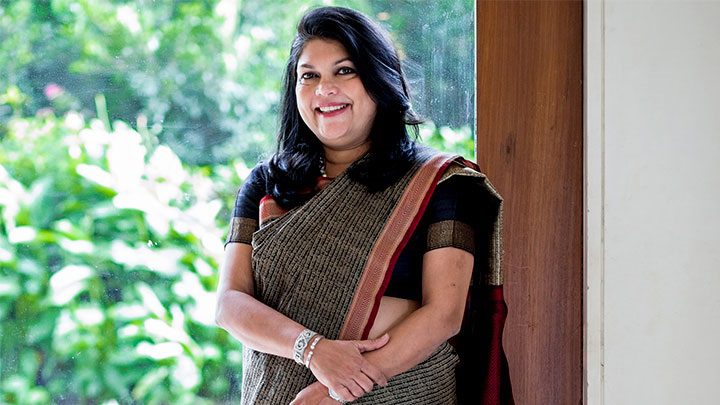(August 17, 2021) Being born with a silver spoon can spell comfort and security, but the affluence can also cast a shadow on freedom and destiny. And this was something that the billionaire heiress Ananya Birla was aware of at crucial junctures of her life. This early realization helped the daughter of Kumar Mangalam Birla chart her own journey and not rest on the laurels and fame of her family name.
It is her heart that Birla follows, and this led to her finding her true calling — music and entrepreneurship. For someone who is passionate about singing and making a difference in the world, Birla is carving her own niche as a youth icon.
Here’s the inspiring story of this Global Indian who decided to write her own story.
Loneliness that led to music
Born to billionaire industrialist Kumar Mangalam Birla and Neerja Birla, Ananya often found herself at the crossroads of living up to her family’s name and carving her own identity. With a bodyguard and a curfew in place, Birla felt claustrophobic trying to fit into the world’s expectations of her. It was music that came to her rescue in times of loneliness and made her feel understood.
View this post on Instagram
Her parents who were supportive of her dreams often helped ease her dilemma. Even as a child, it was music that gave Birla solace and joy. At age 9, she was already training in Indian classical music and she picked up playing the santoor as well having watched her mother play the instrument over the years. Growing up, she fell in love with the guitar and taught herself to play the instrument with the help of YouTube videos. That is when she also began to learn how to compose music. But music continued to remain a hobby for her, until, she moved to Oxford University to study Economics and Management.
The musical journey
It was here that Birla was introduced to the vibrant music scene and the gig culture that played a catalyst in transforming her passion into a career. She began playing at local pubs and clubs in London and began writing her own music. This exposure to several genres of music gave her the confidence to make music of her own. And that’s what she did when she dropped her first single Livin the Life in 2016.
The popularity of the song landed her a worldwide release through AM:PM recording after Dutch DJ Afrojack remixed it. This was the beginning of her innings in music.
Birla arrived on the scene when there were not many takers of the music that she was producing. But the 27-year-old had to break the ceiling to make her voice heard, literally.
In a conversation with Billboard, she said, “When I started out, I was told that there wasn’t really an audience in India for my type of music. Until recently, film music really dominated. Different genres and English-language songs didn’t get much attention. Now labels are pushing independent singers, and there’s a lot more opportunity for artists who want to create their own music. The digital shift and globalization also means the appetite for English language music has increased so much.”
“I think if you want to stand out from the crowd you have to be willing to take risks and go against the grain. Breaking out was tough and I got a bit of criticism at first which was hard to deal with. But, I learned quickly that this comes with the territory and anything creative is 100% subjective. I am so happy people are now responding so positively to my music back home.”
With 2017 came her next single Meant To Be. Such was the response to her song that it made her the first Indian artist with an English single to go platinum in India. In no time, Birla made a name for herself in the music world and was recognized by international artists. So much so that she soon found herself performing at Coldplay‘s concert in Mumbai.
The platinum singer
Birla is one of the few women artists who is making it big in pop music with five of her singles making it to platinum. Be it Hold On (2018) or Unstoppable (2019), Birla has been carving a niche for herself in the world of music one song at a time. “As a woman in a male-dominated industry, it’s important to believe in yourself and not to do anything you don’t feel comfortable with. It can be a tough. When I started out, it really hurt when I was told that my style, or look, or sound wasn’t right. But my vision was strong and I refused to change for anyone. As soon as I was confident being unapologetically myself, everything started falling into place,” she added.
Birla’s songs are an extension of herself, something that she draws from her personal experiences. For her, music is a medium through which she connects with people and emotions.
The singer and songwriter is one of the few artists to collaborate with big name like Sean Kingston and Mood Melodies, thus giving the world a perfect mix of pop music. Birla’s songs and collaborations are a reminder that music is a universal language. “International perspective definitely helps take a song to the next level. I’m influenced by all the places I go. I’ve been lucky to work in some of the best cities across the world where music is a huge part of culture. India, though, is a part of my soul. It is impossible not to be influenced by it, the intensity, the sounds, the centuries of culture,” added the singer.
In just few years, Birla has become a name to reckon with in the international music circles. If her 2019 song Day Goes By was a proof of first collaboration between an Indian and American artist, her 2020 song Everybody’s Lost put her on an American national top 40 pop radio show, Sirius XM Hits, making her the first Indian artist to achieve that feat.
View this post on Instagram
Birla’s music is universal, and her performances at some of the biggest music events like Global Citizen, Oktoberfest and Sunburn is proof of her popularity.
The entrepreneur making a difference
Birla’s love for music is quite evident, but not many know that she founded her first startup at 17. While her heart is in music, her purpose lies in making in a difference and that’s exactly what she did when she started Svatantra Microfin to provide financial aid to women in rural India.
Despite her privileges, Birla was aware of the existing income gap and wanted a company that could help small businesses grow. But it was a challenge to start a company at 17, even with a powerful surname.
“When I started up, I was young and no one was willing to join my team; banks were not willing to lend. No clients are willing to come in. I used to cry in the bathroom when I came home after work,” she told Makers India in an interview. But she was determined to make it happen and currently her startup has reached over one million customers across the country.
View this post on Instagram
Birla expanded her vision and dove into global luxury e-commerce platform with Ikai Asai in 2016. It was in the same year that Forbes named her one of Asia’s Women to Watch.
The youth icon and entrepreneur is also closely involved with MPower, a mental health foundation she started with her mother Neerja to break taboos around mental health. Her own struggles with anxiety as a teenager led to the formation of MPower, and the foundation is working incessantly to create awareness on mental health.
“We have centuries worth of stigma built up around mental health issues – self-perpetuated by the fact that poor mental health is so difficult to talk about. However, the importance of talking about it cannot be overstated. When we talk about mental illness we debunk falsities, tackle isolation and empower those suffering to get the help they so badly need. With global suicide rates on the rise, it is crucial that reaching out for help becomes an act of power as opposed to a sign of weakness,” she told YourStory.
During the pandemic MPower joined hands with the Government of Maharashtra to launch 24×7 helpline and more than 45,000 calls were received within the first two months of its launch.
Not only this, Birla launched Ananya Birla Foundation in 2020 to provide COVID-19 relief work that had distribution of PPE kits and providing essentials to migrant workers at its centre.
At 27, Ananya Birla is the textbook example of a youth icon who is breaking the glass ceiling with her global music one hit single at a time and making a difference in the society with her philanthropic work.



